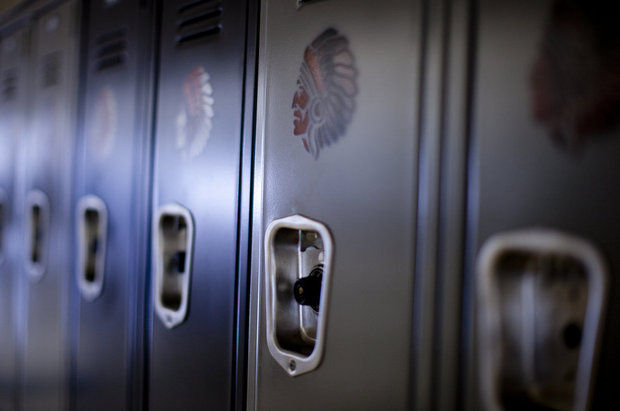
Christian Gaston, The Oregonian
Gov. John Kitzhaber intends to issue a rare veto over a culturally sensitive bill passed by his fellow Democrats amid split testimony from Native Americans.
Senate Bill 215 installs a loophole in a ban implemented by Kitzhaber’s Board of Education, which decided last year to eliminate the use of all tribal mascots at high schools, such as the Banks Braves or Molalla Indians. The mascots, the board found, negatively impact Native American students.
Kitzhaber said he was willing to support a bill allowing schools to adopt the names of tribes, similar to college sports rules, but the bill the Legislature delivered offered too broad an exemption, letting schools keep generic names if a local tribe approved.
“We worked hard to let them know our concerns and the governor doesn’t think the bill gets there,” said Kitzhaber spokesman Tim Raphael.
While a trio of Republicans introduced the mascot legislation, the bill attracted many Democratic votes, passing the House and the Senate by broad enough margins to override a veto.
Even so, Sen. Jeff Kruse, R-Roseburg, said he doesn’t think the Legislature would beat back Kitzhaber’s veto. Instead, he’s hoping the governor will reconsider, and is preparing for the next session.
“I’m just hoping at this point, I don’t know what else I can do,” said Kruse, a chief sponsor of the bill. “The reality of a veto override is non-existent, I know that. So we’d just do another bill.”
The renewed debate over Native American mascots in Oregon this year kicked up at the same time as the owners of the Cleveland Indians rebuffed fresh calls to dump the team’s mascot — the grinning, red-faced “Chief Wahoo.”
In 2012, the Oregon Board of Education established a strict statewide ban giving 15 schools until 2017 to change their mascots or lose state funding.
Many of Oregon’s nine federally recognized tribes didn’t formally weigh into the debate. Those that did were split.
The Confederated Tribes of Coos, Lower Umpqua and Siuslaw Indians supported the mascot ban. Two tribes, The Confederated Tribes of Siletz Indians and the Confederated Tribes of the Grand Ronde both sought the modified policy encompassed in the legislation: let mascots remain only if a local tribe approved. The Coquille Indian Tribe supported the board’s ban, but changed its position, supporting SB 215 during the Legislative session.
Sen. Mark Hass, D-Beaverton, who chairs the Senate Education and Workforce Development Committee, said lawmakers relied on input from local tribes. “It’s emotional on both sides for the tribes and the Oregon tribes wanted this bill, so we passed the bill that they said they supported,” Hass said.
Kitzhaber said it went too far. He wanted the bill modeled after National Collegiate Athletic Association rules, which banned the use of Native American mascots during tournaments in 2005.
NCAA rules let Florida State University keep the Seminoles name for its sports teams after reaching an agreement with the Seminole Nation of Florida.
Brenda Frank, who chaired the Oregon Board of Education when it adopted the ban, said any Native American mascot could hurt a Native American child’s self esteem.
“I still go back to how offensive is that? How is that fair to other tribal people who find that offensive?” said Frank, a member of the Klamath Tribe. “I just don’t think that there is anything that can justify racism.”
Frank said the board took into consideration the concerns of school administrators when it passed the ban, including the cost of replacing uniforms and other materials.
“As uniforms cycle down, they would eventually all be replaced and that’s a cost that districts would pay for anyway,” Frank said.
Kruse still worries about the cost of change at Roseburg High School, which he attended. The school long ago modified its logo in deference to the local tribe, the Cow Creek Band of Umpqua Tribe of Indians.
“In the case of the Roseburg Indians and the Cow Creek Band, everybody’s happy with it,” he told The Oregonian in February.
But it wasn’t that the tribe had asked for the change, and its response illustrates the different ways tribes feel about this issue.
Susan Ferris, a spokeswoman for the Cow Creek Band said students from Roseburg approached the tribe roughly 15 years ago and asked whether the mascot, then a Native American warrior, should be changed. Ferris said tribal leaders told the students to do what they thought was right. The district adopted a new mascot: a feather.
The Cow Creek Band kept out of the mascot debate in Salem this year.
“The Cow Creek stance, historically, seems to be ‘do what you think is right regardless of us.'” Ferris said.
